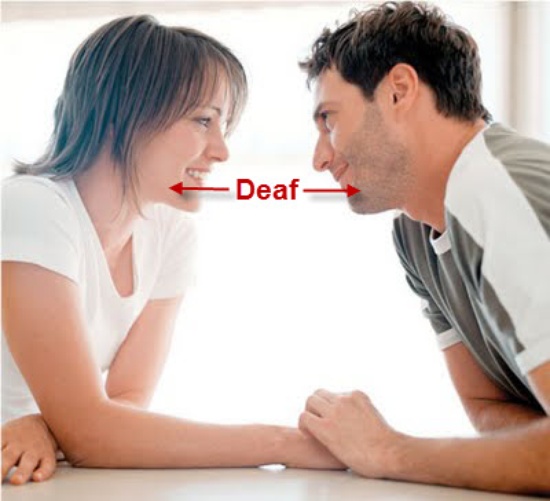Our Big Fat Deaf-Deaf Wedding: Breaking Up, Handling Exes, In-Laws, and Raising Children
Posted by: Staff Writer on Feb. 18, 2013

Fellow Deafies, why do we love to date (or marry) thee? Let us count the ways: It’s the mutual “I’m lost” expression we exchange when the mustached waiter rambles too fast. It’s the passing-notes-in-class giddiness of using sign language in our private corner of the hearing world. It’s not dealing with awkward silences, because silence is our domain anyway. It’s not having to fall asleep with a squeak-squeak-squealing hearing aid when we can’t bear to skip lovers’ pillow talk.
Plus, by God, is there anything more romantic than casting ASL shadows against a candlelit glow?
Little wonder that for many deaf people, their ideal soul mate is also deaf. That includes deaf character Emmett (Sean Berdy) of ABC Family’s Switched at Birth: “My ideal girlfriend is hot, smart, funny, into motorcycles and deaf. If I actually found her, I'd walk away from Brooklyn Decker in a heartbeat,” he declares in Season One, explaining that a hypothetical pairing with the (hearing) Sports Illustrated bikini bombshell would never work because “she wouldn't understand my culture, my family, my perspective on the world.”
Sorry, Brooklyn! But like any other relationship between two humans, a deaf-deaf pairing comes with its unique challenges and benefits. Last week, we contacted a hard of hearing and ASL-fluent licensed counselor Shannon Ruane (who is also a cochlear implant recipient) for practical insights on the other couple variety: Deaf-hearing relationships.
For today’s feature, we picked her brain about the practical aspects of a deaf-deaf pairing:
Breaking Up – Inside the Fishbowl Deaf Community
As the Neil Sadaka song goes, "breaking up is hard to do." It’s more challenging, within the everyone’s-Mom-knows-everyone’s Mom Deaf Community. In a blog, Ruane described the awkward collision of social lives resulting when a deaf man kept running into his (also-deaf) counselor during deaf gatherings.
The same collision happens for deaf couples going through a breakup or divorce. Unlike the anonymity that New Yorkers have, our tight-knit community is one where deaf/HH exes are sure to surface time and time again.
News travels quickly within the Deaf Community. Add 21st-Century tools like Facebook, and it’s a wonder anyone can privately endure a breakup: Who among us hasn’t speculated when someone’s “In a Relationship” status mysteriously disappeared overnight?
Ruane offers a few handy tips:
Take a Page Out of Russell Brand’s Playbook: Hollywood is hardly a role model for happily-ever-after, but it offers a lesson on handling divorces in the public eye, says Ruane. Brand is all hijinks on-screen, but not on a recent Howard Stern interview: “When pressed to trash talk his ex Katy Perry and her new romance with Jon Mayer, Brand would not budge. He described his ex- wife as having been, 'perfect from top to bottom' and left it that. Notice how celebrities praise each other and assure everyone they have nothing but mutual respect - that's really the way to go.”
Don’t Cry, When They Pry: The opposite playbook is the Brandi Glanville-and-Leann Rimes tweet wars. “If rumors run amok that your ex is discussing you amongst mutual friends, do your best to not be on the defensive. Listen to what they have to share with you and thank them for letting you know. Try not to offer an opinion either way. People love drama and they love reactions. The more calm and collected you're able to present yourself (even if you're crumbling inside) the less fun it is for outsiders to keep fishing for reactions.”
At the Endgame, Consider Counseling: Ending a marriage or a long-term relationship hurts, period. But time spent on the velvet couch can stave off long-term misery. “Many couples have found working with a counselor helpful in coming to terms with their need or desire to separate; developing strategies of sharing the news with their families; and in learning how best to support one another during the coming apart process.”
Bottom line: “I think the message is true not just for the Deaf Community, but across the board, that people should tread lightly with how much they share with others concerning the dissolution of their relationship,” said Ruane.
Debunking the "Thou shalt not date your friend's ex(es)" rule
Post-breakup, time has healed the hole in your heart and you are ready to mingle. Dare ye cast wanting eyes on a Deafie friend’s ex?
It’s practically the 11th Commandment that you not date a friend’s ex. But in small communities, there may be exceptions. Advice columnist Dan Savage mathematical waived that rule for another tight-knit community: “Gays and lesbians are about 2 to 5% of the population,” he reminds a gay reader in a Seattle Stranger column. “I'm afraid that arithmetic precludes us from hewing to the ‘bro code’—at least where dating friends-of-exes, exes-of-friends, or exes-of-exes are concerned. We simply don't have the luxury of being as rigid about this (sic) as straight people do. The pickings for us are just too slim.”
The straight v. hearing exception may also apply in hearing v. deaf context, says Ruane. In our community, six degrees of separation often is two or three degrees. The reality is that our culture is simply too small and tight-knit to realistically administer a black-and-white “hands off” rule on ALL friends, peers, ex-RIT/Gally collegiates, and other acquaintances. Her recommended strategy is opposite the one for a breakup: Keep lines of communication open for all parties.
“It's so much better to discuss with your friend and give him/her the heads up you're pursuing a romantic relationship with someone they were previously involved with and openly discuss this; rather than sneak around, keep it a secret, and have it spread to them through the grapevine.”
Friend still not comfortable about you dating his or her former flame? Talk about it and come up with mutual resolutions and boundaries. With luck, before the dating phase becomes a serious relationship, you’ll be able to decide if the friendship trumps the fling (or vice versa).
Big Fat Deaf Wedding: Dealing With In-Laws
If you liked it, you should’ve put a ring on it. But once the sparkling diamond is nested on your love’s finger, you both face a whole host of lifetime considerations. One of them is in-laws, who are notorious for coming out of the woodwork when or if you both start a family.
The “90 percent rule” plays a strong part here. As we mentioned in 7 Ties That Bind All CODAs:
90% of infants who are born deaf are born to hearing parents. But on the flip side, CODA International reports that 85% to 90% of deaf adults statistically have hearing children.
Arithmetically, this leads to potential misunderstandings. Just look at Mrs. Kathryn Kennish, the Switched at Birth mother who flipped when she found out that her biological daughter motorcycle-commutes with a deaf friend. Fearing for their safety, she argued that a deaf person couldn’t possibly be a safe motorcyclist.
We are all still babies in our parents’ eyes, thus “many times, the family's opinions of their future in-law has very little to do with communication or security, abut have a more a deeper emotional response - are they ready to give up their child and entrust their safety and well being in the hands of someone else?”
Worst-case scenarios may plague parents: What if, while sleeping, neither of them hear burglars breaking into the house … let alone hear their own newborn cry? Will so-and-so be a good provider, income-wise? Wouldn’t a hearing spouse be able to “play interpreter” during emergencies?

It Takes a Village to Raise a Child (Of Deaf Adults)
So, you’ve finally charmed the in-laws and are happily married. Give or take a few years, more happy news emerges: A baby is on the way! New parents, get ready for much lobbying, debate, and advice-flinging.
Parents have to set the tone about grandparent involvement, said Ruane. That means being assertive about your childrearing methods, as opposed to having a fly-by-the-seat-of-your-pants air. That can be anything from deciding to move out-of-state to a Texas or California (which has more deaf schools), or refusing cochlear implants for a deaf child, or using the “voice-off” rule around your CODAs, or potty training, or discipline.
“Parents can take a gentle, yet firm, stance with meddling family members,” said Ruane. “‘Thank you so much for your ideas on how the children should be communicating; that's something to think about’ can be a gentle way of telling people you appreciate their input without starting a war by flat out disagreeing.”
Continued conflict could mean it’s time to consider counseling to unearth the subconscious factors at play: Are there boundary issues? Do grandparents see the baby as a do-over for their own failed parenting? Sometimes it may actually have nothing to do with potty training or time-outs, Ruane says.
Next Week: Stay tuned for our third relationships article, about the role that language plays in our love lives.
Shannon Ruane is an ASL-fluent licensed professional counselor and Certified Rehabilitation Counselor in private practice in Philadelphia, PA. If you have a question about services like psychotherapy or have ever wondered if a deaf person can actually benefit from hypnotherapy, find Shannon at Ruane Counseling.
Tags
- deaf
- hard of hearing
- deaf blind
- deaf friendly
- deafhh
- deafies
- sign language
- hearing aid
- asl
- emmett
- sean beardy
- abc family
- switched at birth
- brooklyn decker
- shannon ruane
- cochlear implant
- hearing
- relationships
- deaf community
- fishbowl
- russell brand
- hollywood
- howard stern
- katy perry
- jon mayer
- brandi glanville
- leann rimes
- dan savage
- 11th commandment
- gays
- lesbians
- seattle
- stranger
- big fat deaf wedding
- codas
- kathryn kennish
- texas
- california




Comments